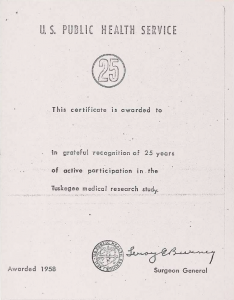The Tuskegee Experiment stands as a haunting reminder of a dark chapter in medical history. This infamous study, conducted between 1932 and 1972, targeted African-American men in Tuskegee, Alabama, and has since become synonymous with ethical violations and racial injustice.

Understanding the Tuskegee Experiment:
The Tuskegee Experiment, officially known as the “Tuskegee Study of Untreated Syphilis in the Negro Male,” was initiated by the United States Public Health Service (USPHS). The study aimed to observe the natural progression of syphilis among untreated individuals, with a particular focus on African-American men.
Motivations and Methods:
The experiment’s motivations were rooted in the prevailing racist beliefs of the time, including the false notion that African-Americans were inherently different from their white counterparts. The researchers recruited participants by misleading them into believing they were receiving free healthcare, including treatment for “bad blood.” However, the true purpose of the study was withheld from the participants, who were left untreated even when penicillin became the standard cure for syphilis.
Ethical Violations and Public Outcry:
The Tuskegee Experiment flagrantly violated numerous ethical principles, including informed consent, beneficence, and respect for the participants’ autonomy. The participants were denied access to effective treatment, leading to severe health complications and even death. The study continued for four decades, despite emerging evidence of the dangers of untreated syphilis and the availability of a cure.
Unveiling the Truth and the Aftermath:
In 1972, the Tuskegee Experiment was exposed to the public through a newspaper report, causing outrage and condemnation. The revelation sparked widespread discussions on medical ethics, racial discrimination, and the importance of informed consent. The ensuing public backlash led to the establishment of ethical guidelines for research involving human subjects, aimed at preventing similar atrocities in the future.
Legacy and Lessons Learned:
The Tuskegee Experiment serves as a poignant reminder of the significance of ethical considerations in scientific research. It exposed the systemic racism deeply ingrained within medical institutions, highlighting the need for diversity, inclusivity, and cultural sensitivity. The study led to reforms in research ethics, resulting in the establishment of institutional review boards (IRBs) to ensure the protection of human subjects.
Shaping a Better Future:
While the Tuskegee Experiment remains a painful chapter in history, it has also spurred positive change. The lessons learned from this tragedy have paved the way for comprehensive reforms and stringent regulations in medical research. The principles of informed consent, respect for autonomy, and equitable treatment have become the cornerstones of ethical medical practices today.
The Tuskegee Experiment represents an egregious violation of human rights and ethical standards. It serves as a constant reminder of the need for vigilance in safeguarding the rights and well-being of research participants. By reflecting on this dark chapter, society can continue striving toward a future where justice, equality, and compassion prevail in medical research and healthcare for all.
Cite This Article
"The Tuskegee Experiment: The Dark Chapter in Medical History" History on the Net© 2000-2024, Salem Media.
April 29, 2024 <https://www.historyonthenet.com/the-tuskegee-experiment-the-dark-chapter-in-medical-history>
More Citation Information.





